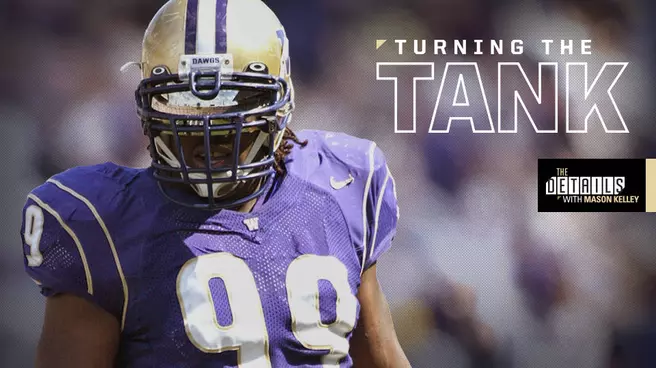The Details: Now A 'Convert Communicator,' Tank Johnson Returns to UW

By Mason Kelley
GoHuskies.com
They still call him “Tank.”
That’s the thing about nicknames – they tend to stick. However, while that’s the name most commonly used in discussions about former Washington standout Terry Johnson, the person who earned the moniker is drastically different these days.
Instead of a defensive lineman living the NFL life, Johnson now describes himself as a “convert communicator.”
“I once had a way of thinking and I think a different way now,” he said.
In a transition that began in the final two seasons of his seven-year NFL career, Johnson has moved from player to communicator. He wants to share the lessons he has learned with younger generations of athletes, both in college and at the next level.
He has credibility, because he lived the life. He experienced the good and the bad. He realized he had a message he needed to share.
“When you’re in high school, when you’re a college football player, you’re in a cocoon,” Johnson said. “When you go to the pros, you’re in the world and you have to adhere to the world’s dos and don’ts, what’s socially accepted and socially unaccepted.
“It’s not necessarily doing bad things, it’s leaving the opportunity for bad things to happen. Most of the time it’s not the action, but it’s living the life where certain things can happen, leaving you vulnerable and susceptible to these types of things.”
Johnson wants to help young football players avoid negative situations that court the spotlight. He wants to give athletes the tools that will help them avoid the situations that affected Johnson during his playing career.
What prompted the change for a player named Tank? What fueled his passion for pushing players toward positive pursuits?
Well, when the SWAT team kicks down your door, let’s just say it’s an eye-opening experience.
“It had nothing to do with me and had more to do with my friend that I had in my house,” Johnson said. “My family had to go through that terrible ordeal.”
At the time, Johnson said he was in the process of getting his life on track.
“It was probably the best time in my life,” he said.
But everything changed in that moment.
“The community I lived in felt the people I had around me were a danger to the community,” he said. “The politics involved there got me in a lot of trouble. I learned quickly about politics, about race relations, about being a good neighbor, understanding perception.”
During his NFL career, Johnson was both arrested and suspended. But the player he was is not the person he has become.
“I realized the world is not as simple as I thought it was,” he said. “It’s much more complex. I don’t think our young men realize that until it’s too late.”
Two years before his professional career ended, Johnson flew to New York City to meet with Roger Goodell. Johnson told the NFL commissioner he wanted to give back and teach.
“I’ve learned throughout the years that it’s not so much the message, but the messenger,” Johnson said. “I feel like guys are really receptive to guys with credibility.”
Johnson started working on a pair of programs to help athletes in transition. One of them is called “Moving the Chains,” and it is geared toward social rehabilitation.
“It’s basically a program to help professional athletes to stay grounded,” he said. “When you lose that, it’s a way to try to get you back.”
Johnson said the league has been receptive to the program and he is working with NFL Player Engagement as an ambassador, working in a “multitude of roles.” One of his responsibilities is speaking at the NFL Rookie Symposium.
To help Johnson pursue his passion of helping athletes, he is back in school at Washington. In fact, he made the dean’s list last quarter and will wrap up his sociology degree in December.
“What better time in America to be a sociology major with what is going on all around the country, studying sociology, people, the statistics and the way things are, that’s a very in-demand field right now,” he said. “I’m very happy I’m going back to finish, because I have years of life experience to confirm that this is, in fact, what I want to do with my life.”
Once Johnson graduates he will start a paid internship with the NFL.
But, now that he has returned to Washington, he often finds himself looking back on his college career. He still has an “unwavering passion” for the university and the football program.
As he wraps up his degree, he would like to find a way to give back to the program, offering his services to coach Chris Petersen.
“If it’s in the best interest of the football program at the University of Washington that guys like me shut up and stay away, then I love the program enough to do that,” he said. “But, on the flip side of that, if it’s in the best interest of the university and the football team for guys like me to come back and teach, come back and have an official position and work with these young athletes, then I love the university enough to do that.”
Johnson will be on the field Saturday when the Huskies play Utah State at 2 p.m. The opportunity to be back in Husky Stadium, “is extremely gratifying, because I know I put at least one brick in the stadium that holds it up.”
They still call him Tank, but the convert communicator has a new message and a fresh perspective. He wants to help. He believes his target audience will listen.







